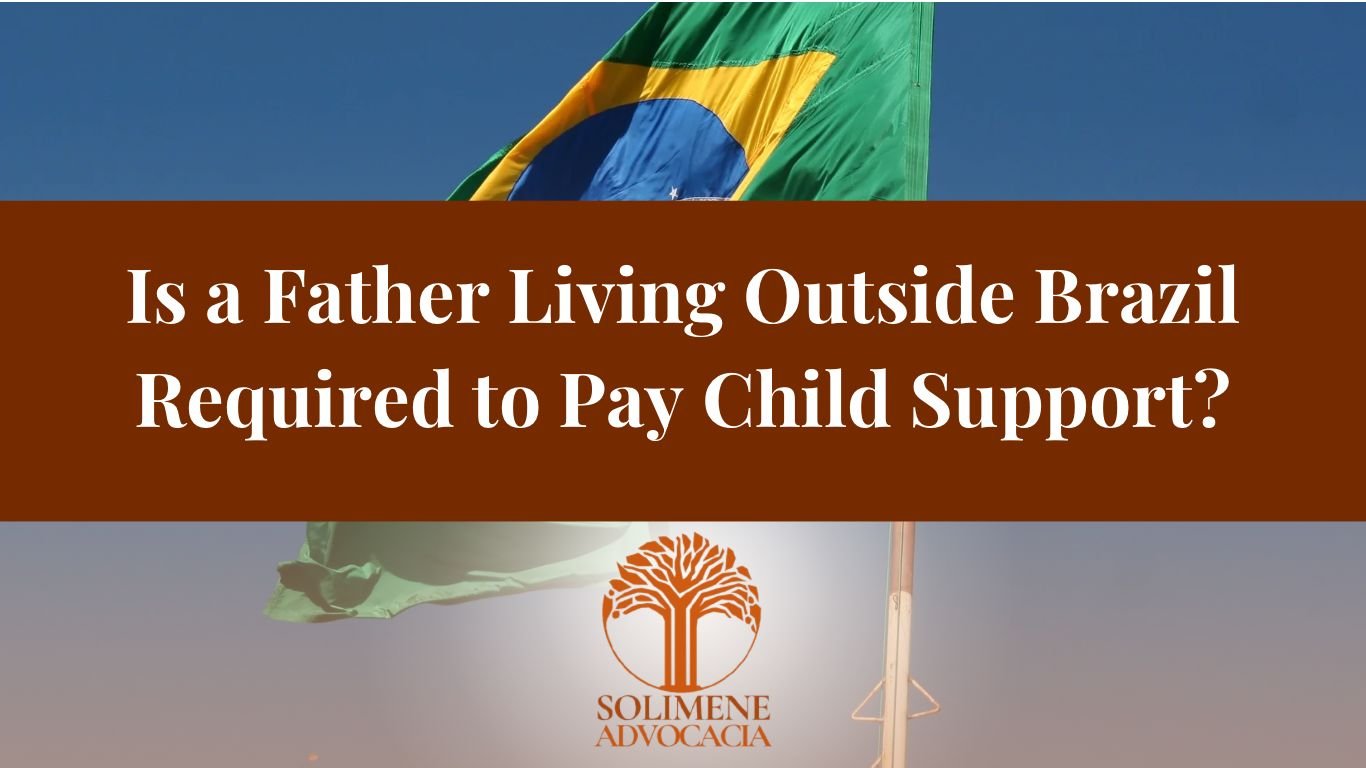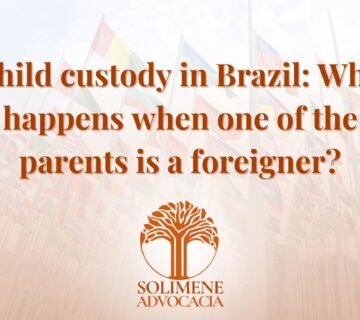This is a common question among foreign fathers who have children living in Brazil: After all, is someone who lives outside the country also required to pay child support? The answer is yes. According to Brazilian law, the obligation to provide for one’s children does not depend on the parent’s place of residence or nationality. It is a legal and moral duty that remains in effect even when the father lives abroad.
Child support in Brazil is regulated by the Civil Code and the Child Support Law (Law No. 5.478/68). It covers not only food expenses, but also education, clothing, healthcare, leisure, and other basic needs of the child. It is a fundamental right of the child and a duty of the father—regardless of where he lives.
In this article, as a lawyer specialized in family law, I will explain in detail:
What is Child Support in Brazil?
How is the Amount of Child Support Calculated?
Is a Foreign Father Living Outside Brazil Required to Pay Child Support?
How Does the Process of Setting Child Support Work for Fathers Living Abroad?
What Happens if a Foreign Father Living Outside Brazil Is Required to Pay Child Support but Fails to Do So?
Father Living Abroad Required to Pay Child Support: Why Is It Essential to Have a Specialized Lawyer?
If you are a foreign national living outside Brazil and have children with a Brazilian citizen, it is essential to understand that, even if you live abroad, you may still be legally required to pay child support in Brazil. This responsibility does not end due to physical distance or moving to another country.
1. What is Child Support in Brazil?
Under Brazilian law, child support is the legal obligation to provide the necessary resources for another person’s livelihood—typically a minor child who is unable to support themselves. This obligation is governed by Law No. 5.478/1968 (the Child Support Law) and Articles 1,694 to 1,710 of the Brazilian Civil Code. Brazilian law outlines various situations in which the duty to provide support applies. Here’s who is entitled to receive it:
Minor Children
This is the most common case. Parents are required to support their children until they turn 18. This obligation is automatic, arises from parental authority, and does not depend on the child’s income.
Children Still in Education
If the child turns 18 but is still attending university or technical school and is not yet able to support themselves, Brazilian courts have held that the obligation may be extended until the age of 24 or until the completion of the course.
Children with Disabilities
Child support may be lifelong if the child has a physical, mental, or intellectual disability that prevents them from working and supporting themselves.
Although the term may suggest it refers only to food, the legal concept is much broader. Child support includes:
Food;
Housing;
Healthcare;
Education;
Clothing;
Leisure;
Transportation;
Other basic needs of the recipient.
2. How is the Amount of Child Support Calculated?
Brazilian law establishes that child support must be determined based on two fundamental criteria:
- The needs of the recipient: the child;
- The financial capacity of the payer: the responsible parent.
Thus, the judge assesses:
- The child’s monthly expenses: education, food, healthcare, etc.;
- The current and proven income of the father;
- Whether the father has other children or dependents;
- Whether there is formal employment or income from abroad.
The judge may determine:
- A percentage of the net salary: for those with a fixed income;
- A fixed monthly amount: generally adopted for fathers who are self-employed or live outside Brazil.
How is the amount of child support calculated in practice?
When the payer has formal employment
If the father has a steady job with a signed work contract or regular declared income, the judge may set child support as a percentage of the net salary. In practice, this percentage usually ranges from 20% to 30%, depending on the specific circumstances of the case.
When the payer is self-employed or lives abroad
When there is no fixed salary or the payer lives outside Brazil, the judge tends to set a fixed monthly amount, taking into account the presumed financial capacity and the child’s proven expenses.
When there is income variation
The judge may determine that the amount be reviewed periodically or upon request by the parties, in case of changes in income or in the child’s needs.
I will explain through an example. Follow along:
Practical Example of Child Support Calculation
Situation:
- Foreign father, residing in Europe, with an average monthly income of €4,000 (approximately R$22,000);
- Minor child lives with the mother in Brazil;
- The child’s expenses for school, healthcare, food, and housing amount to around R$4,000 per month.
Possible Court Decision
The judge understands that the father can afford to contribute 30% of his net income, considering the cost of living abroad and his financial capacity;
30% of R$22,000 = R$6,600 per month.
However, if the child’s expenses are R$4,000, the judge may consider this amount sufficient to cover all of the child’s needs and set the support payment at that level, even if 30% exceeds it.
In other words, the judge may adopt an amount proportional to the child’s needs, even if it is less than the percentage of the father’s income.
Outcome
Child support set at R$4,000 per month, based on the child’s needs, not solely on the father’s income.
3. Is a Foreign Father Living Outside Brazil Required to Pay Child Support?
If you are a foreigner, live outside Brazil, and have a Brazilian child, it’s very common to ask: am I legally obligated to pay child support in Brazil?
The answer, under Brazilian law, is yes.
The fact that the father lives outside Brazil does not remove his legal responsibility to support a child living in Brazilian territory.
National legislation makes no distinction between a Brazilian father and a foreign father.
The obligation arises from the parental bond, not from nationality or place of residence.
Brazil is a signatory to several international treaties, including:
- The 1956 New York Convention;
- The 2007 Hague Convention on child support.
These agreements allow court rulings issued by Brazilian courts to be enforced abroad, based on international legal cooperation.
4. How Does the Process of Setting Child Support Work for Fathers Living Abroad?
The process follows these steps:
Step 1: Child support lawsuit in Brazil
The child’s mother or legal guardian files a child support claim in the Brazilian courts, even if the father lives abroad.
Step 2: International service of process on the foreign father
The father will be formally served abroad, through letters rogatory or international legal cooperation, depending on the country of residence.
This procedure is essential to guarantee due process and the right to a full defense.
Step 3: Presentation of evidence and documents
Both parties must present:
- Proof of the father’s income;
- Proof of the child’s needs: expenses with school, healthcare, housing, etc.;
- Information about dependents and other financial obligations.
Step 4: Determination of the support amount by the judge
The Brazilian judge will consider two main factors:
- The child’s needs;
- The financial capacity of the foreign father.
Based on that, the amount may be set:
- As a percentage of the father’s income;
- As a fixed monthly amount, especially if the father is self-employed or earns in foreign currency.
Step 5: Definition of the payment method
The judge may determine that the payment be made through:
- International bank transfer to the account of the mother or legal guardian in Brazil;
- Judicial deposit in Brazil, when necessary;
- Another secure method, depending on the specific case.
It is important that the payment is documented and verifiable.
The process follows clear stages: court action in Brazil, service abroad, review of evidence, setting of the amount by the judge, and definition of the payment method.
Fulfilling this obligation, with the support of a lawyer specialized in family law, ensures the child’s rights and protects the foreign parent from severe legal consequences.
5. What Happens if a Foreign Father Living Outside Brazil Is Required to Pay Child Support but Fails to Do So?
Here’s the translation for the excerpt you provided:
“If you are a foreigner, have a child in Brazil, and have been legally ordered to pay child support, it is important to know that this obligation is serious and backed by strict legal provisions. Many parents living abroad mistakenly believe that being outside Brazilian territory exempts them from the consequences of non-payment. This perception is incorrect.
Failure to fulfill the child support obligation can lead to serious consequences, even for those residing outside Brazil. Below, as a family law attorney in Brazil, I will explain the main penalties:”
Let me know if you’d like to continue with more translations!
1. Judicial Enforcement of the Debt in Brazil
The mother or the responsible party for the child can file an action for the enforcement of child support, requesting payment of overdue installments. Possible measures include:
- Freezing amounts in Brazilian bank accounts;
- Seizing assets of the debtor in Brazil;
- Registering the debt with a notary (protest).
2. International Enforcement of the Judicial Decision
If the father resides in a country that is a signatory to a treaty with Brazil, the judicial decision can be enforced abroad through:
- A request for international cooperation via the Brazilian central authority (AGU – Attorney General’s Office);
- Enforcement of the judgment in the debtor’s country of residence;
- Freezing assets and accounts abroad, according to local legislation.
3. Registration with Credit Protection Agencies
The delinquent father may have his name protested in a notary office and registered in Brazil’s delinquent databases, such as SPC and Serasa. This measure makes it difficult to carry out banking transactions and obtain credit in the country.
4. Civil Imprisonment for Non-Payment
Brazilian law provides for civil imprisonment of up to 90 days for those who owe child support and fail to pay the last three overdue installments, provided the non-payment is voluntary and unjustified. Although civil imprisonment is not automatically applied outside Brazil, this measure can be considered by countries that allow the enforcement of foreign judgments, in accordance with international treaties and local legislation.
To fulfill this obligation responsibly and with legal security, the best course of action is to seek guidance from a family law attorney and act transparently before the court.
6. Father Living Abroad Required to Pay Child Support: Why Is It Essential to Have a Specialized Lawyer?
If you are a foreigner, live outside Brazil, and have a Brazilian child, you’ve probably asked yourself: Am I really obligated to pay child support in Brazil? And more importantly: How should I do this legally, safely, and without complications?
At this point, the advice I always give is straightforward: Do not face this process without the support of a Brazilian family law attorney. Here’s why it’s essential to have a specialist lawyer:
Why the process runs in Brazil under Brazilian laws
Even if you live abroad, the process will be conducted in Brazilian court. Only a lawyer registered with the OAB (Brazilian Bar Association) can properly represent you and follow all procedural acts.
A specialized professional will:
- Act on your behalf before the judge;
- Present documents and defense arguments;
- Monitor deadlines and decisions;
- Negotiate agreements that avoid prolonged litigation.
Why family law requires technical and scientific knowledge
Child support legislation in Brazil has specific details. A lawyer who is not specialized in family law may make strategic mistakes, such as:
- Not knowing how to correctly calculate the child support amount;
- Failing to present relevant documents;
- Missing essential deadlines in the process;
- Failing to handle agreements with international validity.
A specialized lawyer, on the other hand, knows: - The criteria used by judges;
- The methods for determining fair amounts;
- Court practices;
- The avenues for international cooperation.
Why they can help avoid coercive measures
Without a professional’s intervention, you may be subject to:
- Judicial enforcement of the debt in Brazil;
- Protest and registration with delinquent databases;
- Freezing of assets and bank accounts in Brazil or abroad;
- Civil imprisonment for non-payment, as provided by Brazilian law.
A lawyer will prevent these situations through proper, transparent, and strategic action before they escalate.
Why they can propose agreements with international validity
A good family lawyer can formalize an agreement between you and the party representing the child, ensuring:
- Judicial recognition in Brazil;
- Regular enforcement through international transfers;
- Legal security for both parties.
This type of solution avoids litigation, high costs, and emotional strain.
5 Risks of not having the help of a specialized family law attorney
- Lack of proper defense in the process;
- Unfavorable decision with an amount disproportionate to your financial situation;
- Debt enforcement with extreme measures;
- Legal uncertainty regarding the validity of payments made outside the process;
- Damage to your name and reputation before Brazilian courts.
| If you are a foreign father, live outside Brazil, and have a Brazilian child: The obligation to pay child support is real, legally imposed, and can be enforced abroad. Having a Brazilian family law attorney is crucial to ensure that your rights are respected and that your duties are fulfilled legally, fairly, and effectively. |
Conclusion
If you are a foreign father, live outside Brazil, and have a Brazilian child, you now know that Brazilian law is clear: You are legally obligated to contribute to child support, regardless of your nationality or country of residence.
In Brazil, child support is not limited to food. It covers all expenses essential to the child’s dignity, such as housing, health care, education, clothing, and leisure. The amount is set by a judge based on the child’s needs and the father’s financial capacity. Even if the father lives abroad, the obligation persists and can be enforced through the courts.
In this complete guide, you’ve seen that child support can be paid through international transfers, as determined by the court. The important thing is that the payment is made safely, documented, and within the deadline. Failure to fulfill this obligation can result in severe consequences, such as judicial enforcement, asset seizure, protest, name registration in credit databases, and even civil imprisonment, as provided by Brazilian law.
Therefore, if you wish to fulfill your obligation fairly, responsibly, and safely, the first step is to consult a family law attorney in Brazil to represent you before the courts, ensure your rights are respected, and make sure the child support amount is aligned with your financial situation. Moreover, the specialized lawyer can propose agreements, avoid litigation, guide you on the proper payment methods, and oversee the potential enforcement of the judgment abroad.
I’ll leave it here and hope I’ve been helpful.
If you know anyone in this situation, share this post.
Keep following us, and see you next time!
Also, follow our YouTube channel: https://www.youtube.com/watch?v=1Cdk3VWj29I
Read also:
Let me know if you need anything else!







Sem comentário